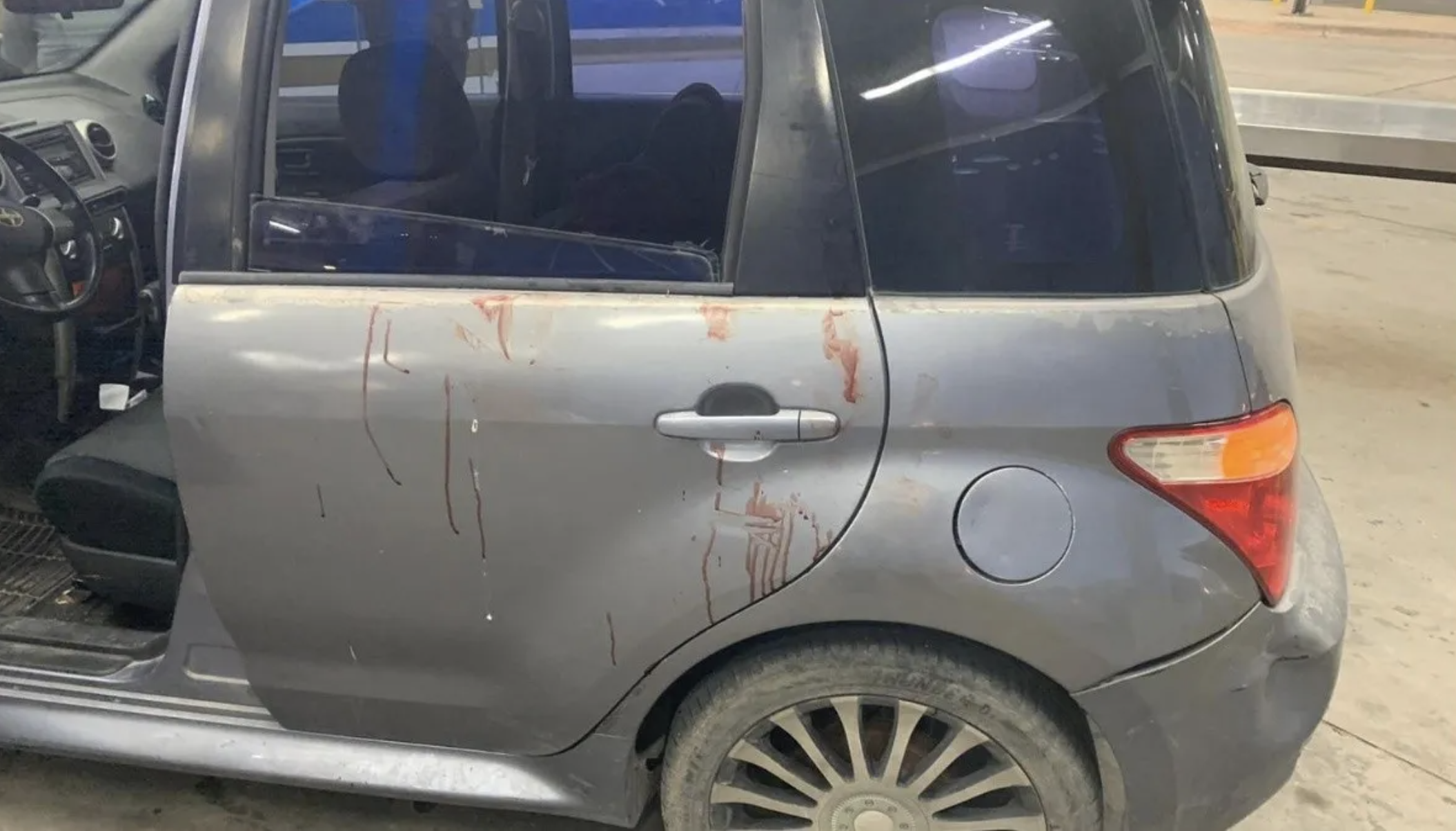About 25 miles to the west of Brownsville, Texas, a caravan of sedans and pickup trucks loaded with household appliances, outdoor tools and other items wait in a queue stretching a mile back to cross the Los Indios Free Trade Agreement bridge into Mexico. The groups are made up of merchants and their families who make the 1500 mile journey to the southern border of Mexico. From there, it's on to Guatemala, El Salvador, Honduras and other countries in Central America where they resell the goods to make some extra cash and see family members over the holidays. Known as transmigrantes for the name of the visa granted for the passage through Mexico, these merchants travel in groups for additional security.
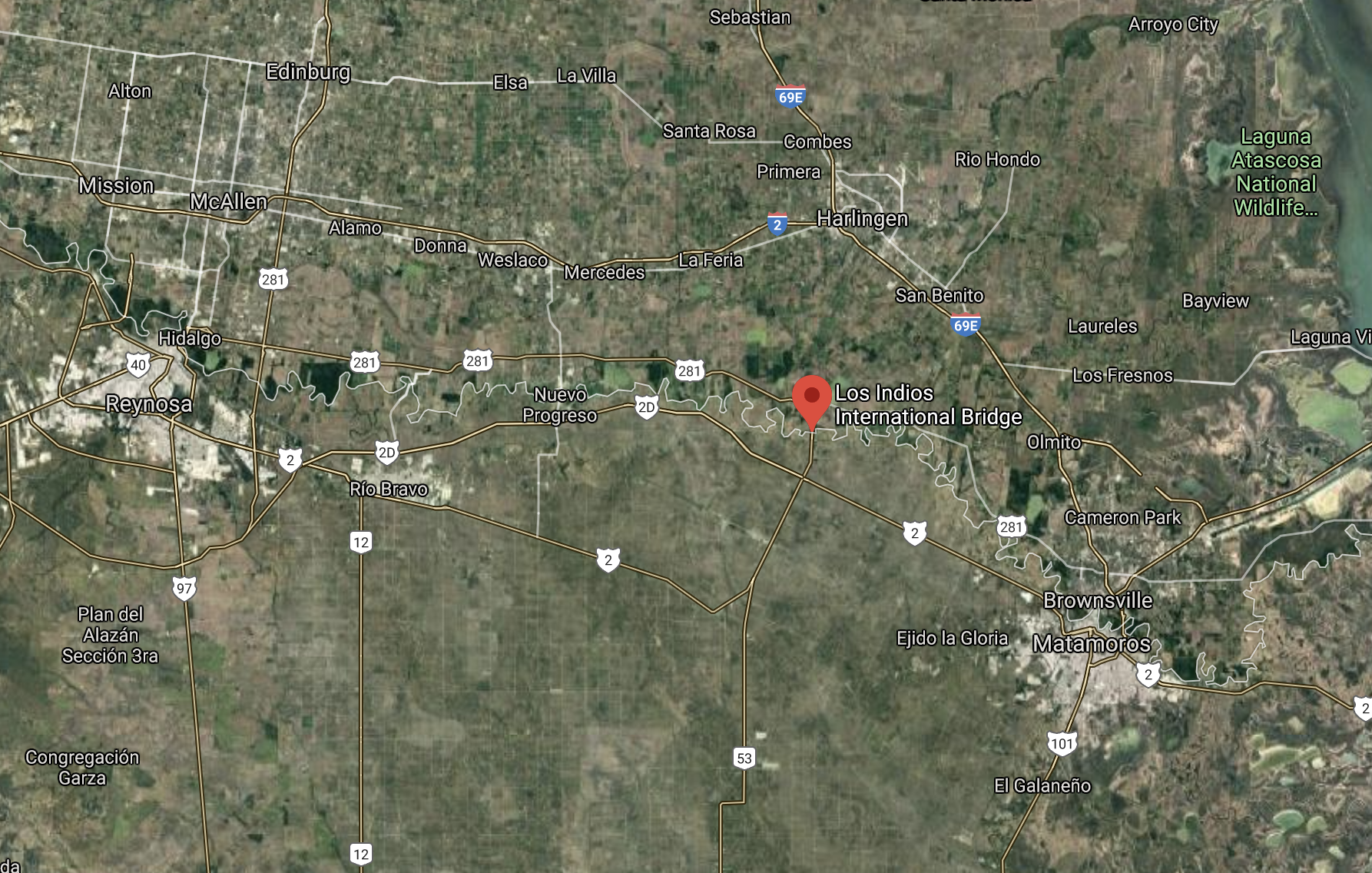
In 2002, legislation was passed restricting all transmigrante traffic to a single crossing: the Los Indios Free Trade Agreement bridge. The location seems to be an obvious part of the rationale behind the policy (i.e. out of the way).
The journey has historically been fraught from extortion and robbery by the highway police in Mexico. By some accounts, that's improved over the years from how it used to be. Now, the extortion is just from the Cártel del Golfo (CDG) in Matamoros, who charge a customs fee at the Los Indios crossing. The cuota consists of a $200-300 payment, which adds up to millions of dollars in revenue for the cartel annually. In exchange for the payment of the fee at customs, the transmigrantes are promised safe passage through Tamaulipas.
On March 7, 2019, an attack left one US citizen dead and three transmigrantes wounded near the Los Indios bridge on the Mexican side. The woman killed in the attack was María del Consuelo Ramos Aguirre, a legal representative with Corporativo Logístico Aduanero Alpha, a company owned by Luis Biasi.
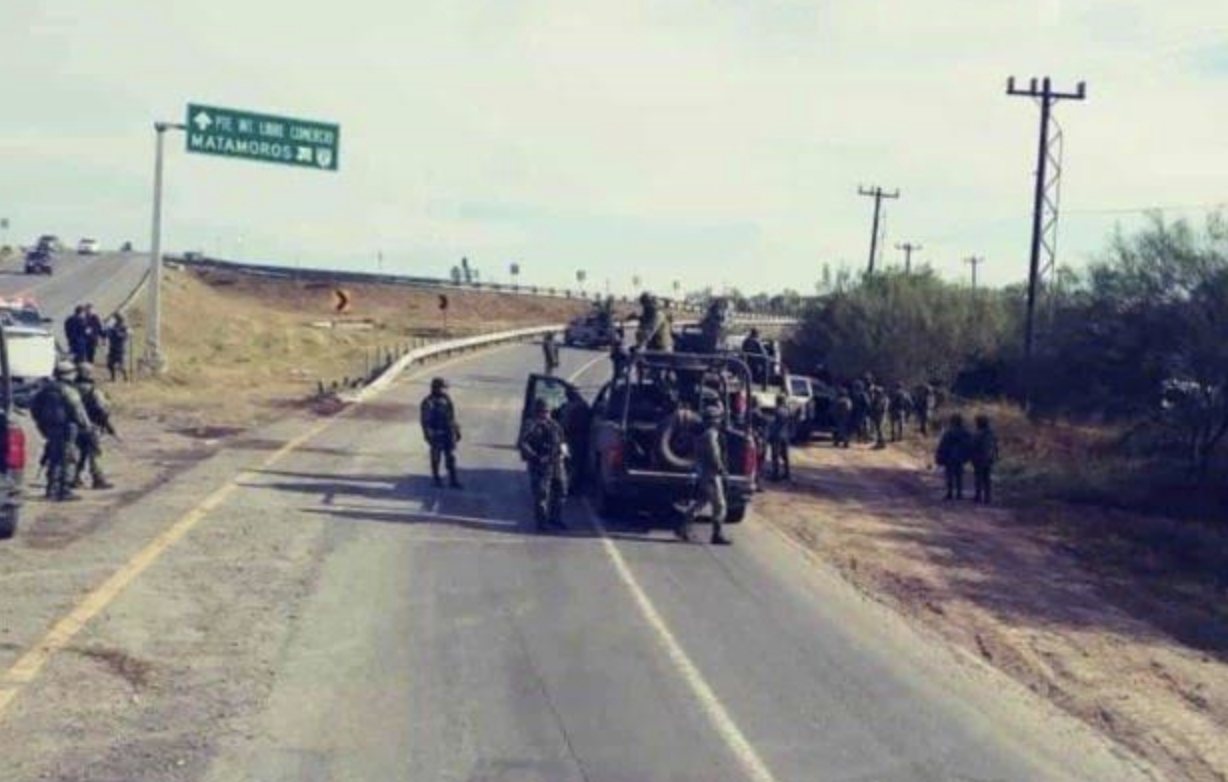
In August 2019, the president of Human Rights International Alvaro Arce Paz sent a letter to President Andrés Manuel López Obrador calling for a safer route for the transmigrantes due to the extortion from the CDG and the fatal shooting from March at the Los Indios crossing. The proposal called for the transmigrantes traffic to be redirected through the Presidio/Ojinaga crossing along the border between Texas and Chihuahua.
Luis Alfredo Biasi is a former official with the Secretary of Social Development (Sedesol) in Matamoros who worked with Leticia Salazar, the former PAN mayor of Matamoros. Biasi and Salazar were also romantically involved at that time.
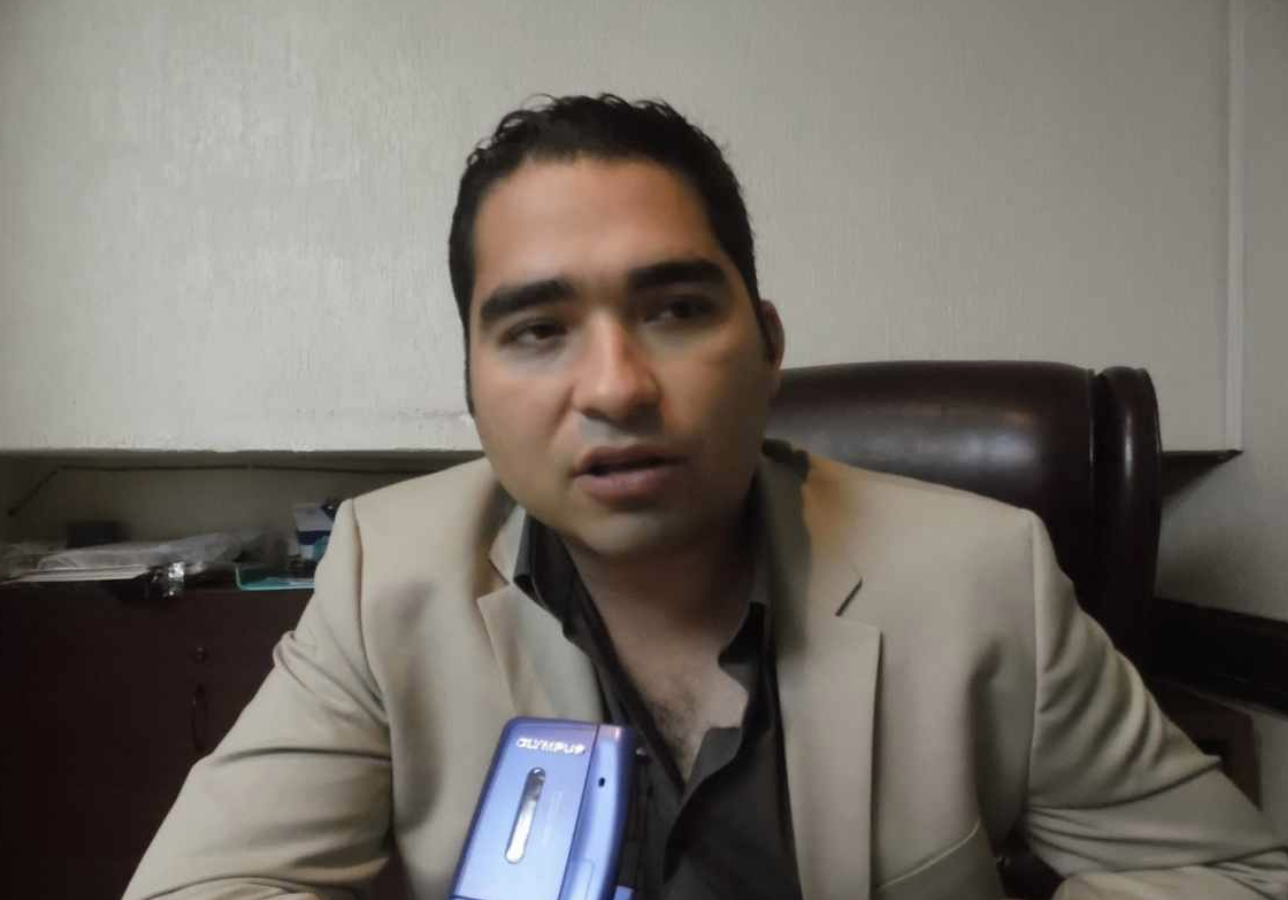
Biasi has been implicated in several controversies including for his role in the creation of the infamous Grupo Hercules, an elite police force in Matamoros made up of mostly ex-military reporting directly to mayor Lety Salazar. Directly is not an exaggeration. In fact, at her first state of the city address, the mayor wore one of the Grupo Hercules uniforms. In October 2014, Grupo Hercules was implicated in the disappearances and murders of four young people, three of whom were US citizens.

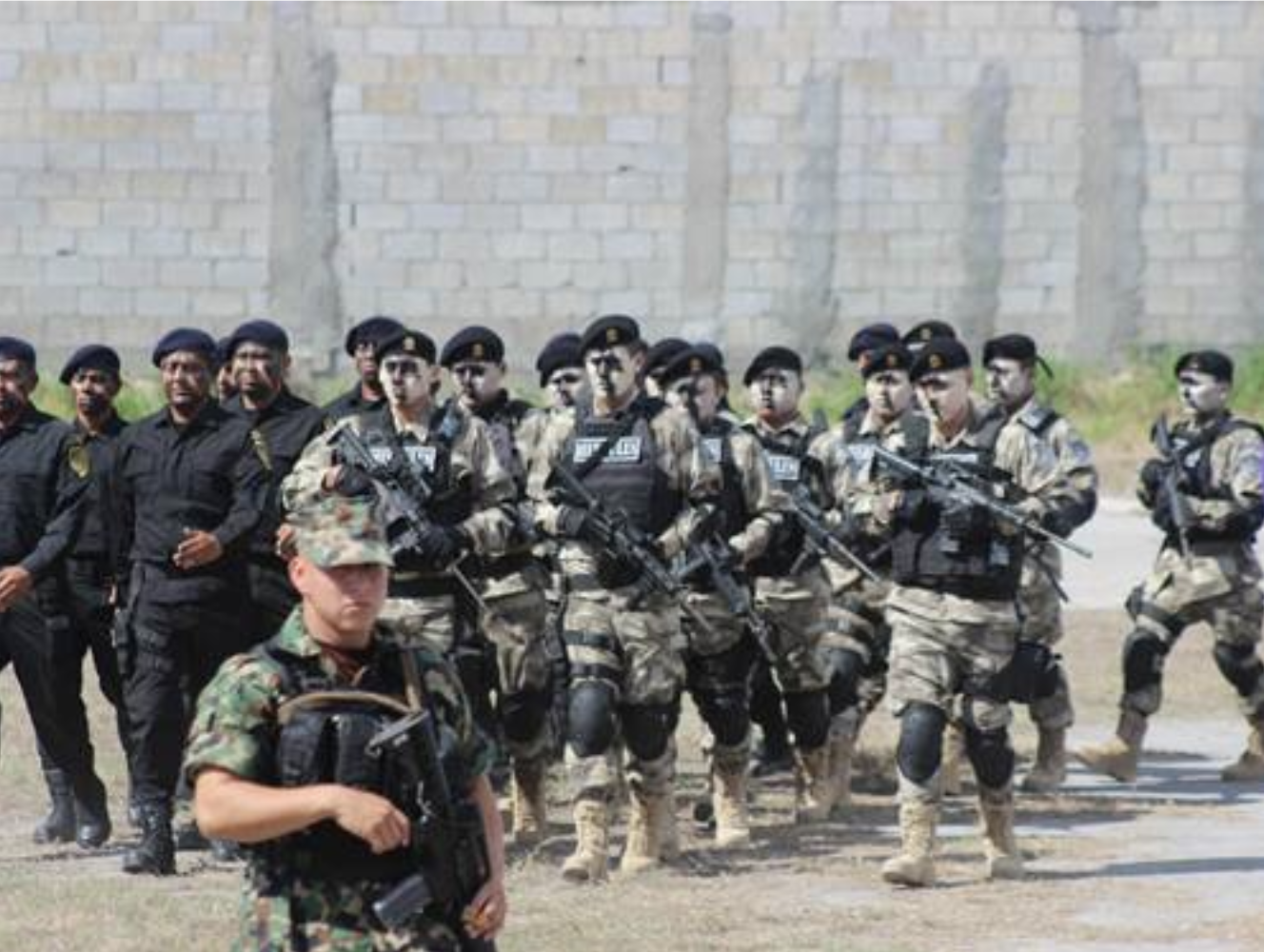
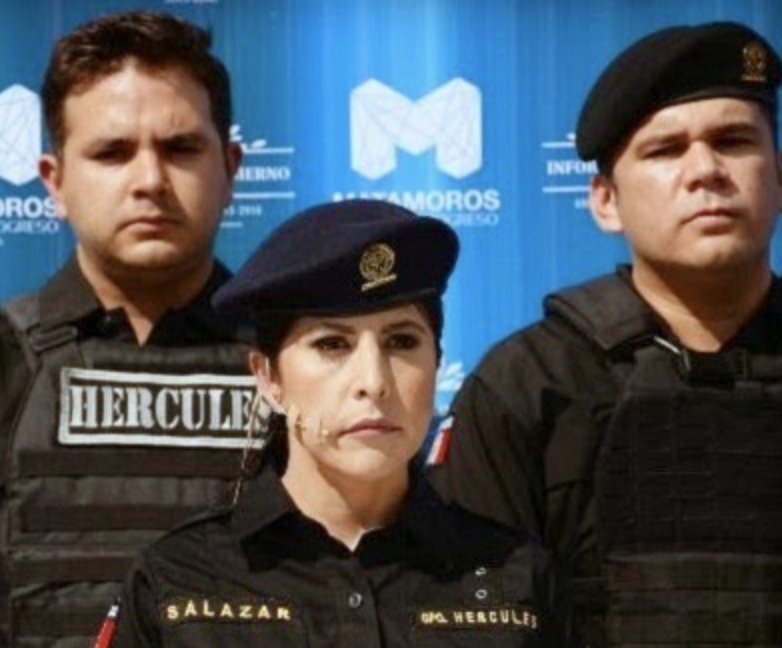
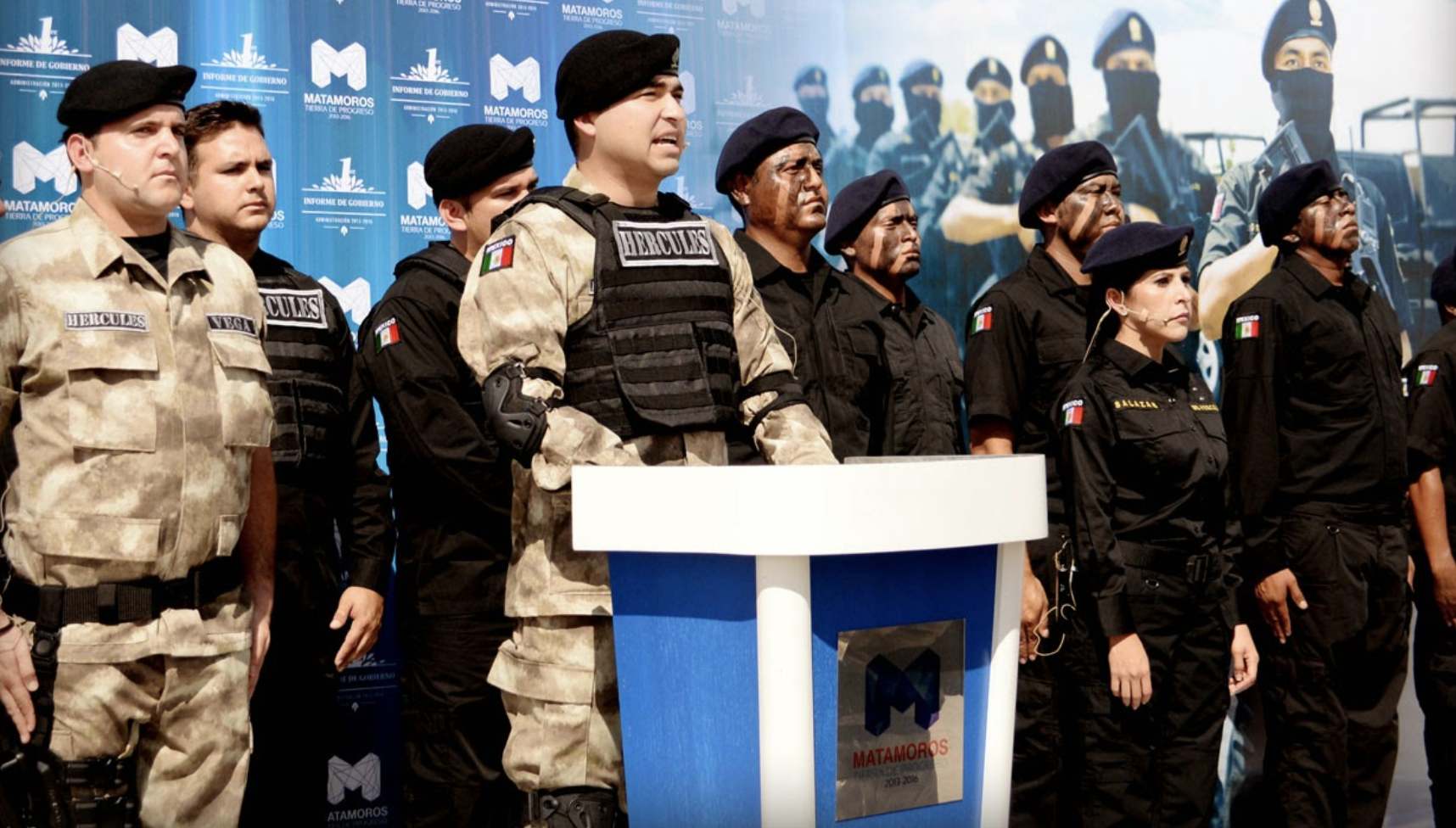
At a restaurant along an underpass below the Lucio Blanco International Free Trade Bridge, US citizens Alex, Érica and José Ángel Alvarado Rivera, along with Mexican citizen José Guadalupe Castañeda, were allegedly detained without a warrant by members of the Mexican Navy and Grupo Hercules on October 13 or 14, 2014. According to an investigation by the national human rights commission (CNDH) in January 2018, they were supposedly taken to a vacant lot and interrogated. According to the testimony of a detainee who claimed they were also present that night and witnessed the Alvarado Rivera siblings and José Guadalupe Castañeda in custody, Lety Salazar arrived at the vacant lot where the detainees had been taken and ordered the Navy personnel to place the prisoners at the disposal of Grupo Hercules. On October 29, the bodies of the 4 victims were found executed with a shot to the head at a warehouse owned by Luis Biasi. The case remains open and no one has yet been prosecuted for the disappearances and murders.
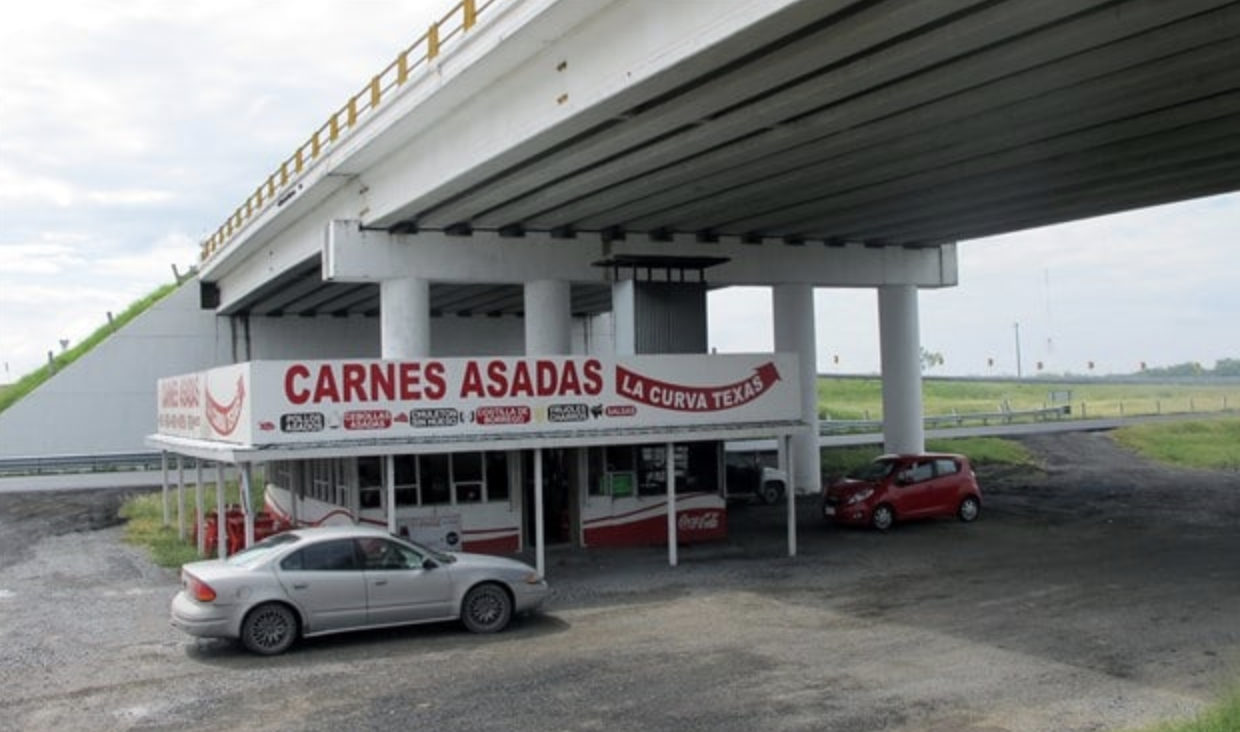
In December of 2014, Biasi was arrested and charged with tax evasion by the now-defunct PGR, but was released after supposedly (according to reporting which may be based on statements from Biasi's political enemies) paying 2 million in bail a month later in January 2015. Biasi allegedly had $9 million pesos in unpaid taxes from 2012 according to reporting. The scandal and ongoing legal proceedings from the case upset plans for Biasi to seek office as a deputy for the PAN in Matamoros in the upcoming election. Instead, Lety Salazar's father, Ramiro Salazar, ran for the position.
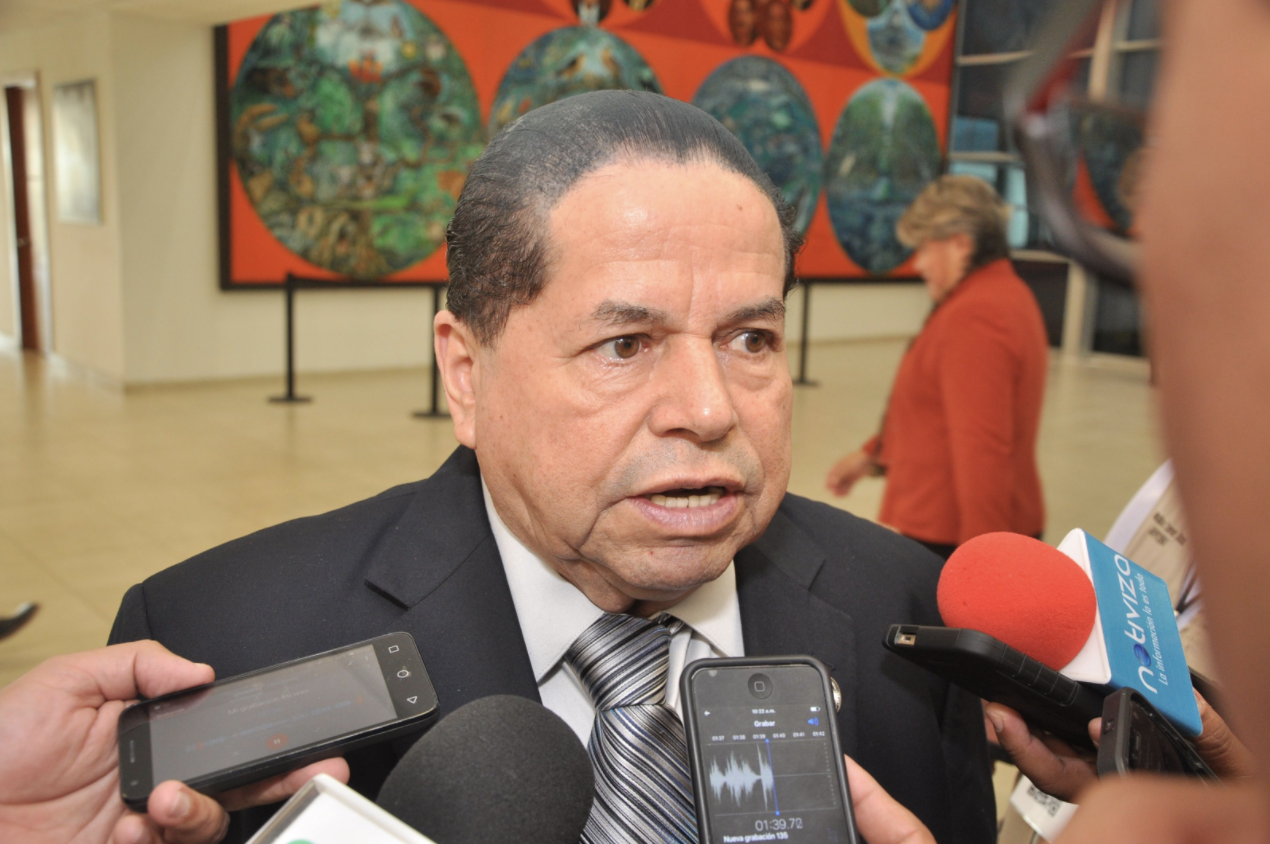
According to reporting, Biasi and the Salazar family also partnered in several businesses together. Investigators (who may not be reliable) claimed they suspected that Biasi and the Salazars used financial resources from both the Matamoros municipal budget and their businesses, which were suspected of being front companies for illegal enterprises associated with organized crime. According to the same reporting, the alleged smuggling operations were overseen by Jose Mariano Vega Rodríguez, Chairman of the City Council and an administrative commander of Grupo Hercules. In March 3, 2016 a letter was sent to PAN President Ricardo Anaya by the mother of the 3 US citizens disappeared by Grupo Hercules protesting Jose Mariana Vega's candidacy for mayor in Matamoros. Ultimately, José Vega did not become the mayor of Matamoros.
Biasi was a patent holder and his company Corporativo Logístico Aduanero Alpha worked with transmigrantes processing their visas and paperwork in addition to supposedly (again, based on allegations from Biasi's political enemies) extorting them. The business of processing permits put him in direct contact with the CDG who ultimately controlled extortion at customs, among other things.
The extortion racket at the Los Indios crossing is managed by Carlos Martínez Perez, aka "El Cuate", the son-in-law of notorious former CDG boss Osiel Cárdenas Guillen. According to reporting, US authorities identified Cuate Martínez for his involvement in the corruption of customs officials in the US while extorting traffic crossing at Los Indios. Additionally, investigators with the office of the Attorney General in Mexico (PGR, now FGR) discovered that in addition to drug-trafficking, kidnapping and extortion of piso from area businesses, the CDG oversaw extortion at customs and controlled all the goods crossing the border through El Cuate. According to the same reporting, Cuate Martínez's operation forced customs businesses (i.e. patent holders like Biasi and his company) to pay them fees for crossing various merchandise, including stolen fuel, vehicles, electronics, clothing and illicit drugs.

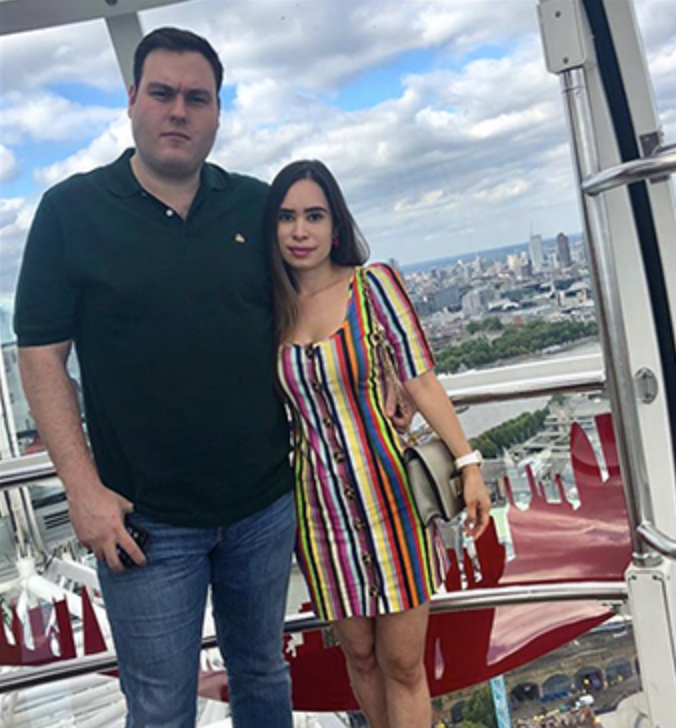
Like many illicit enterprises associated with organized crime, El Cuate and his associates operate legitimate businesses in addition to their illegal activities. According to reporting, the DEA identified several associates of Cuate Martínez, including Rigoberto Brown or Rigoberto Brown Cantú or Rigoberto Castorena Cantú, supposedly a nephew of Osiel Cárdenas, and Brown's brother-in-law, Roberto García Villarreal, aka "El Betín", owner of Transmigrantes Los Indios in San Benito, Texas, as well as Luis Biasi, Jesus Juraidini, aka "El Chuy", and his nephew, Oscar Juraidini, allegedly in charge of controlling all the international crossings from Reynosa to Matamoros under the direction of the sister of Osiel Cárdenas.
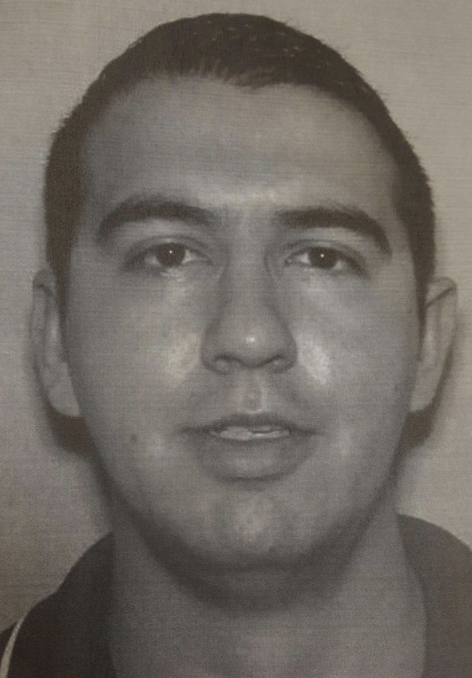
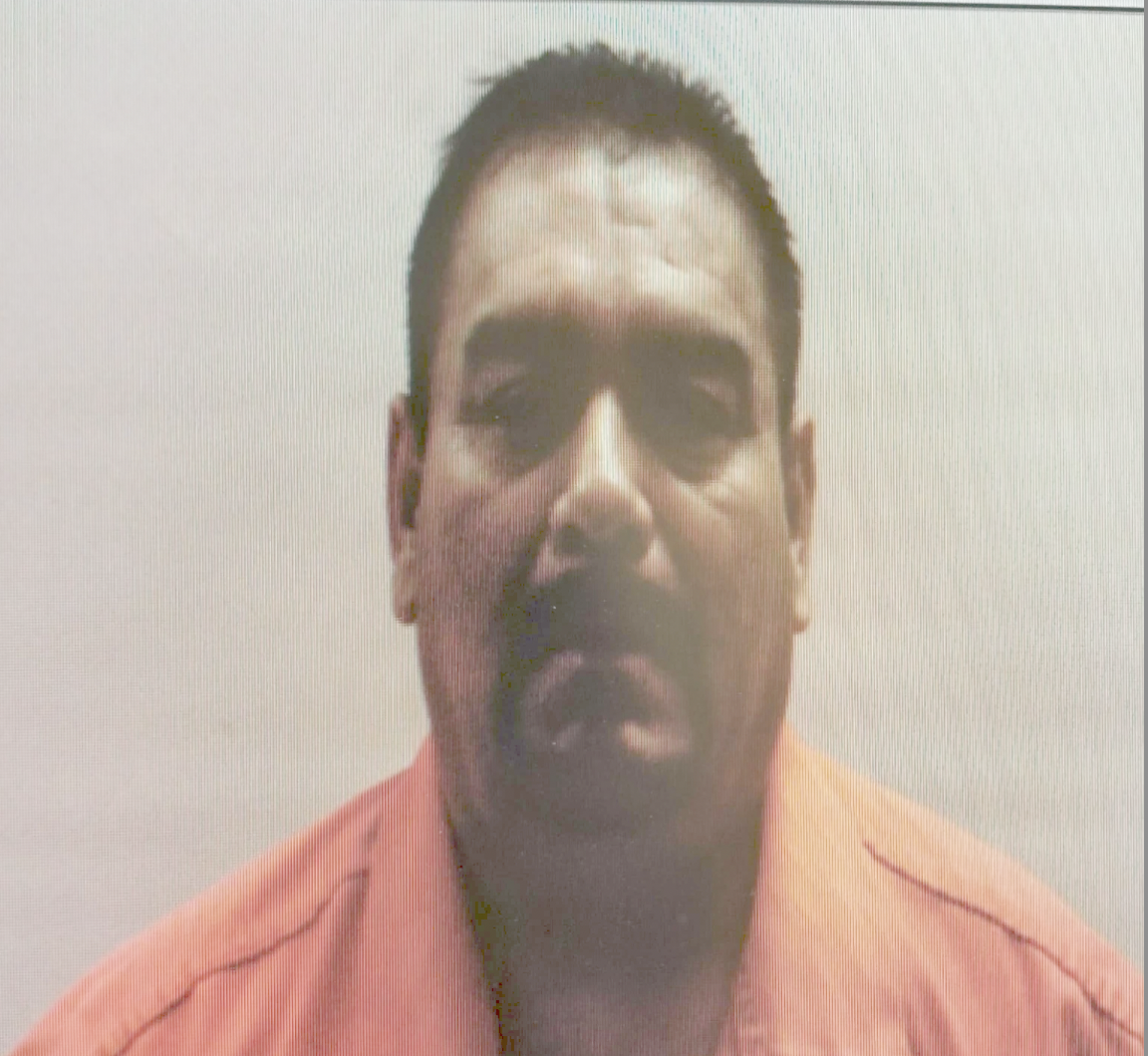
In addition to criminal enterprises, El Cuate reportedly owns several businesses in Matamoros, including the Plaza Genesis where the old El Dorado theater was demolished in 2015, a laundromat and the Casino Intercontinental, another laundromat of sorts.
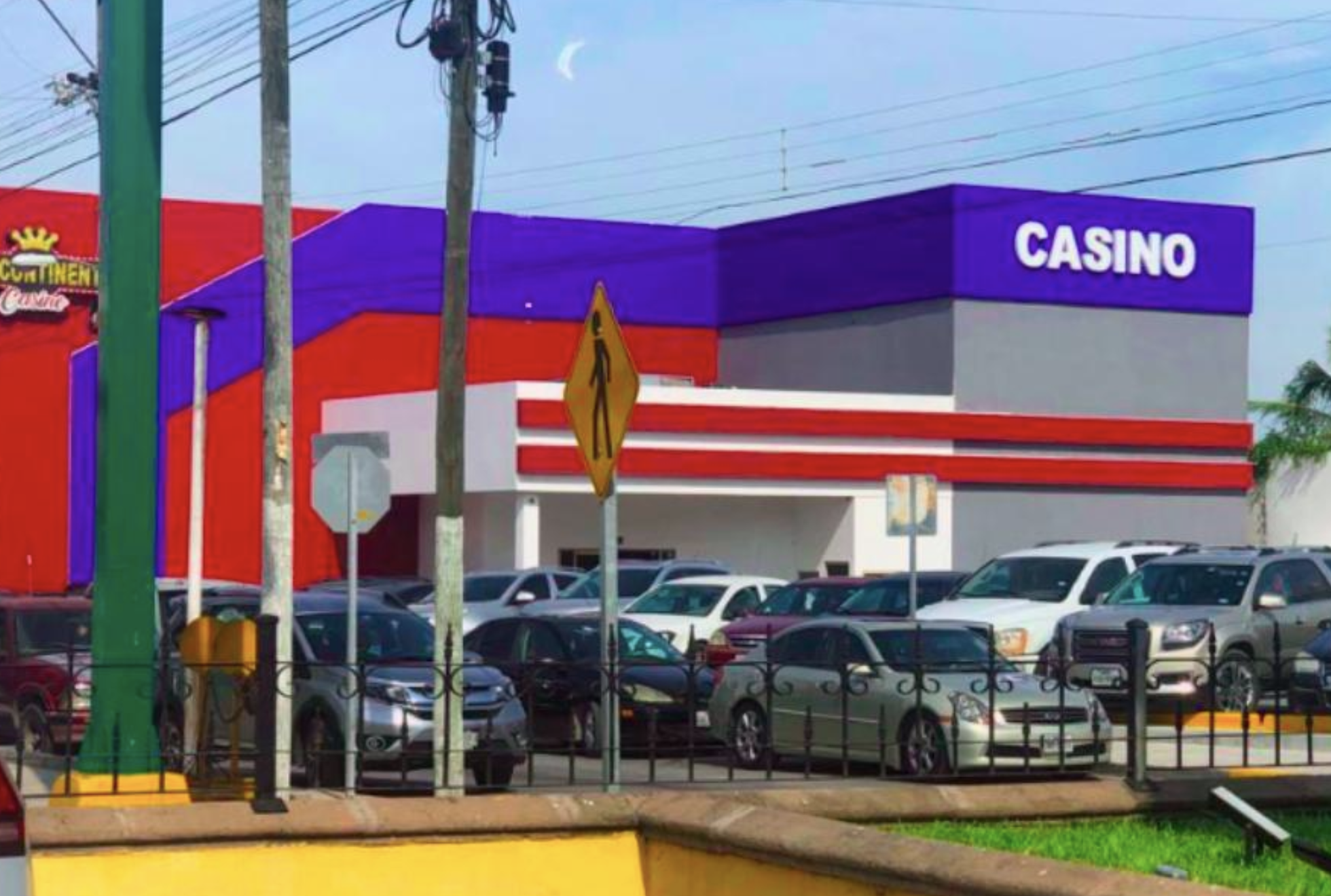
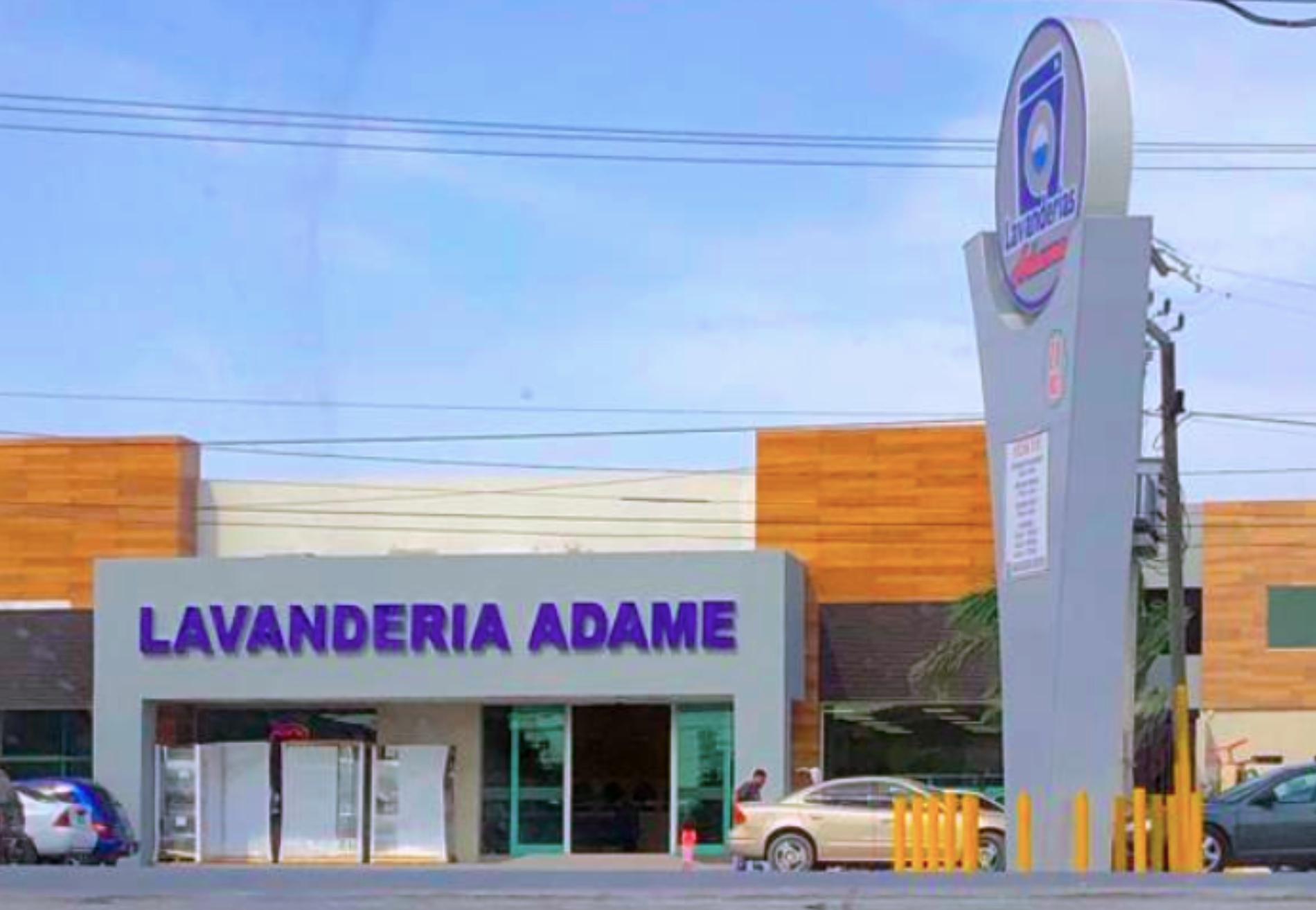
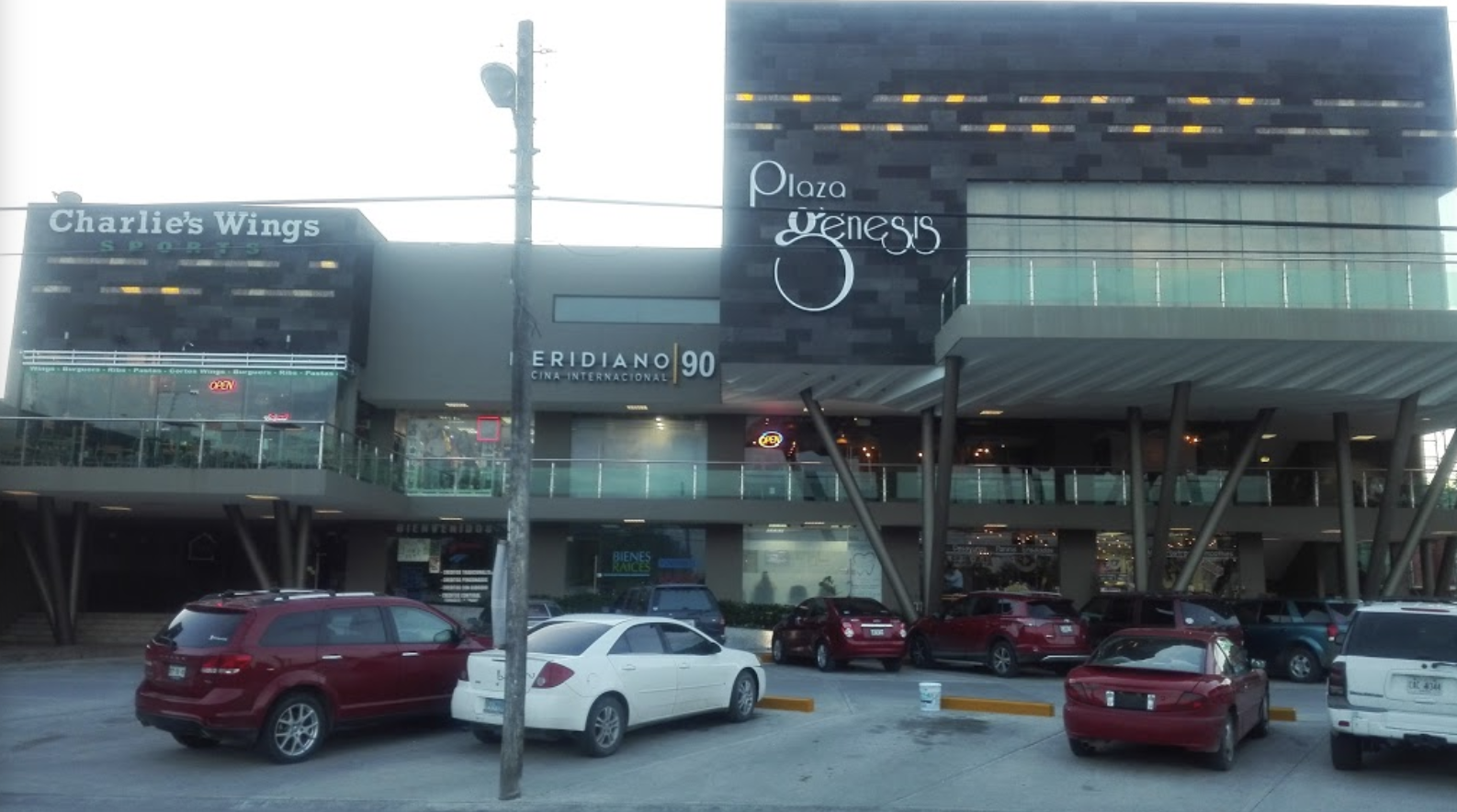
In May of 2017, the state congress in Tamaulipas at the direction of Governor Francisco Cabeza de Vaca issued an order which prohibited authorizing land use and construction licensing for casinos and strip clubs. The rationale behind the policy was that such businesses were frequently associated with money laundering and other illegal activity. On November 10 2018, Julio Cesar Almanza Armas, president of Federation of National Chamber of Commerce Secretary (Fecanaco) wrote a letter asking Cabeza de Vaca to reinstate the licensing for casinos. It was later alleged that he had received .5 million pesos as a "voluntary contribution" from the casino owners for the favor. On November 20, 2018, in an abrupt reversal of the policy with only days left before the inauguration of President López Obrador, the legislative body reinstated licensure for casinos.
On November 12, 2018, mechanical problems forced a small aircraft bound for Reynosa to make an emergency landing on a road in Altamira moments after takeoff from the International Airport in Tampico. The emergency landing killed two young motorcyclists on the road and injured the two men on board, Marco Antonio González Garcia, aka "Mr. Cloro" or "Mr. Chlorine", and pilot Miguel Gerardo Gonzalez Rocha. According to witnesses, the two injured men climbed out of the plane and Marco González called for help while Miguel retrieved their bags from the aircraft. Shortly afterwards, they were picked up by Saúl Rivera Caballero, deputy director of the Regional Center for Civil Protection South Zone, and another person who took the two injured men to the nearby Angeles hospital. Ironically, the crash ultimately led to the discovery about Mr. Cloro's contracts with the state.
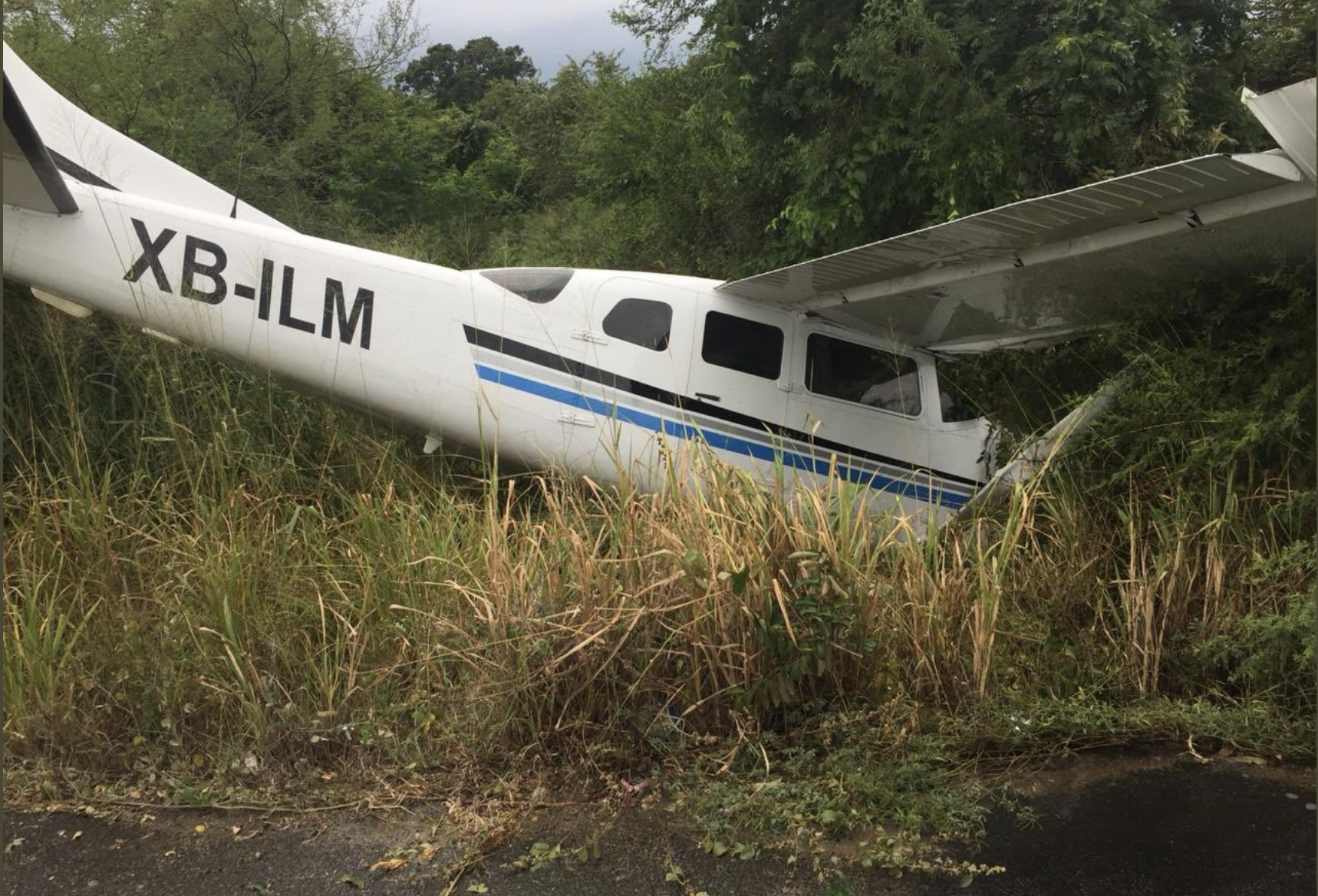
Marco González is a businessman who supplied the state water department, Comapa, with chlorine and polymers for water treatment in municipalities throughout the state. In 2017, he was awarded a no-bid deferred purchase and sale contract by the Tamaulipas government as the exclusive supplier of water treatment chemicals for the municipalities of Altamira, Tampico and Reynosa.
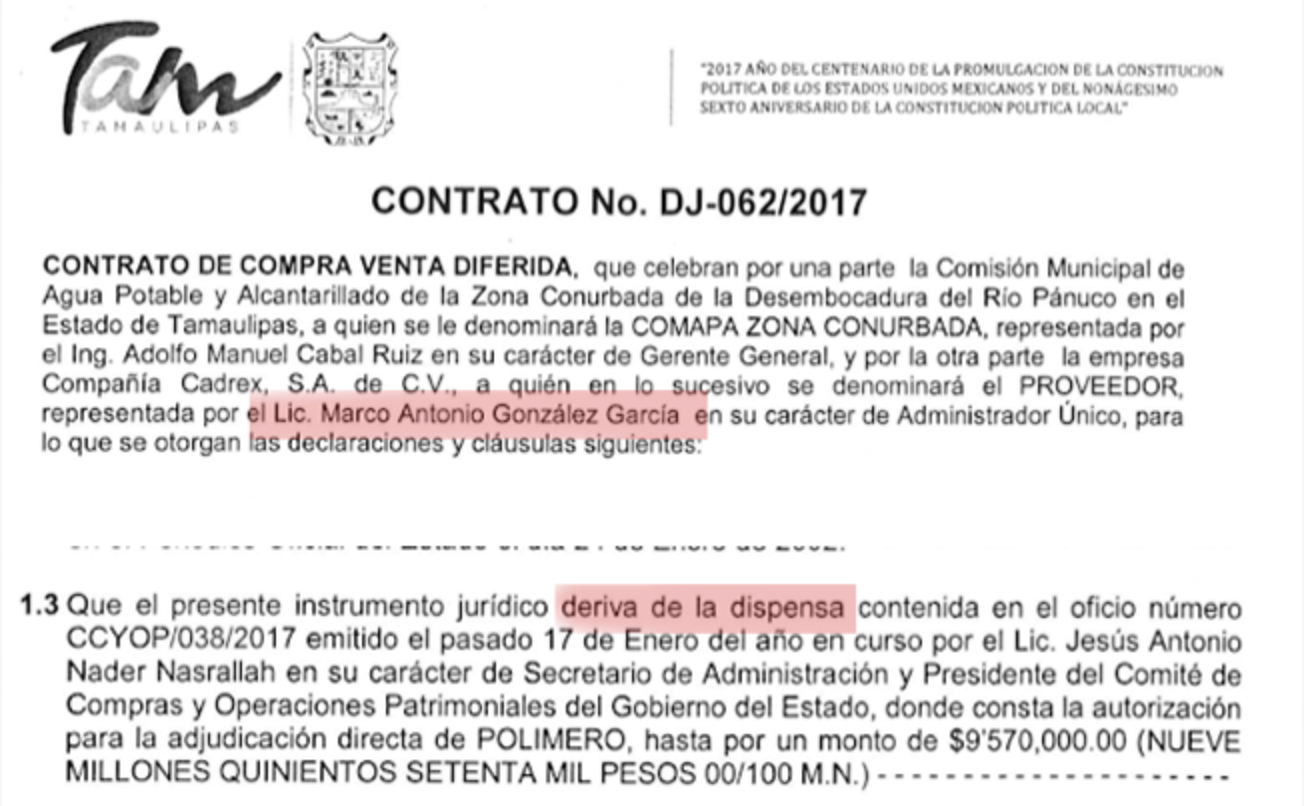
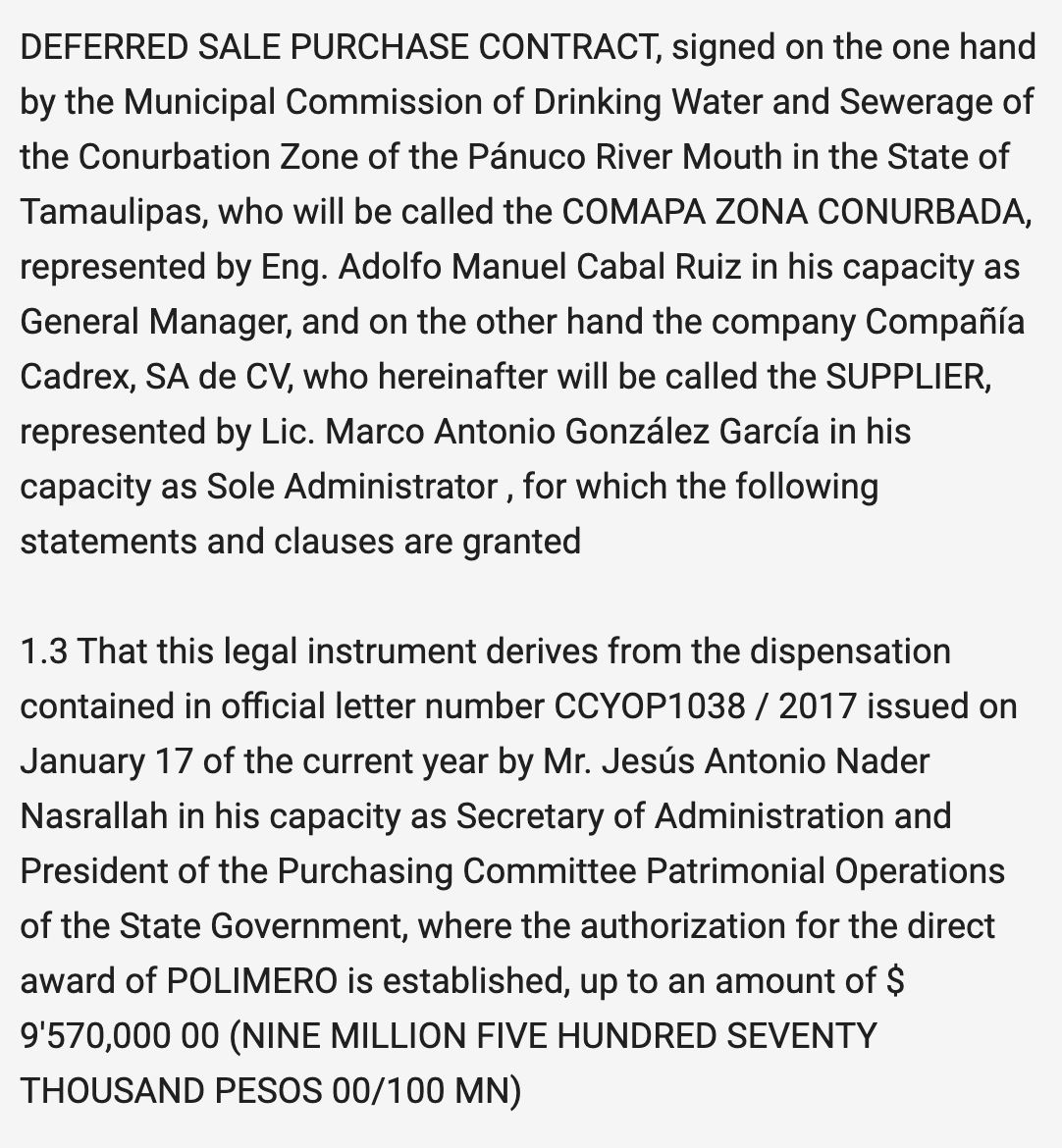
According to unconfirmed reports from a source close to the General Manager of Comapa Zona Conurbada of Tampico-Madero Adolfo Manuel Cabal Ruiz, the plane destined for Reynosa had been transporting bags filled with money. The money was allegedly a tribute for Head of the Governor's Office Victor Manuel Sáenz Martínez and Senator Ismael Cabeza de Vaca, the brother of Tamaulipas Governor Francisco García Cabeza de Vaca.
In a longstanding practice, the state government awards no-bid contracts directly through executive ruling to businesses who then pay a percentage between 10-30% of the contract's value to officials and/or their family members, friends and trusted associates in return. In this way, officials from the Governor's Office award contracts to friends and family, and then receive a tribute in exchange for the favor.
Currently in Tamaulipas, the direct award process reportedly goes through the Undersecretary of Projects and Contracts with the Office of Public Works Reynaldo Garza Gomez, nicknamed "El Sr. de los Sobornos" or "Lord of the Bribes", and, until recently, the Head of the Governor's Office Victor Manuel Sáenz Martínez, who retired from the position on October 16, 2019 but continues working with the governor as an advisor.

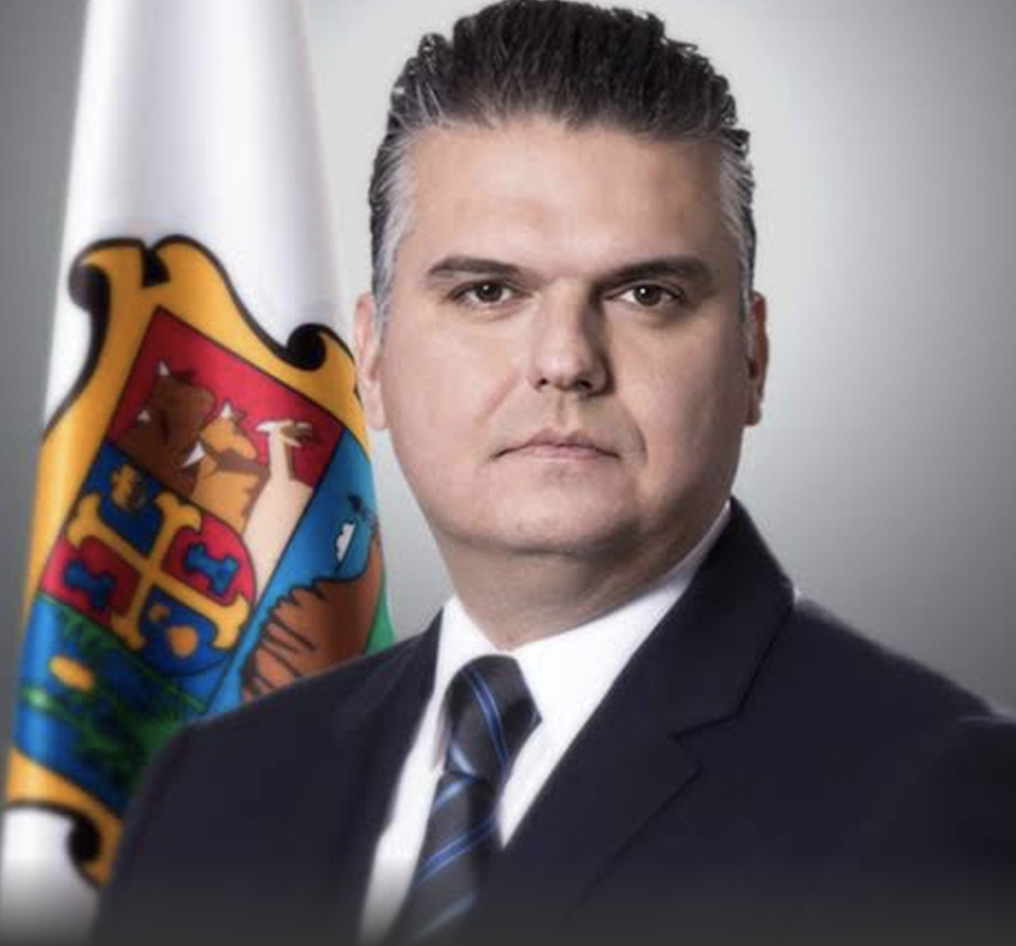

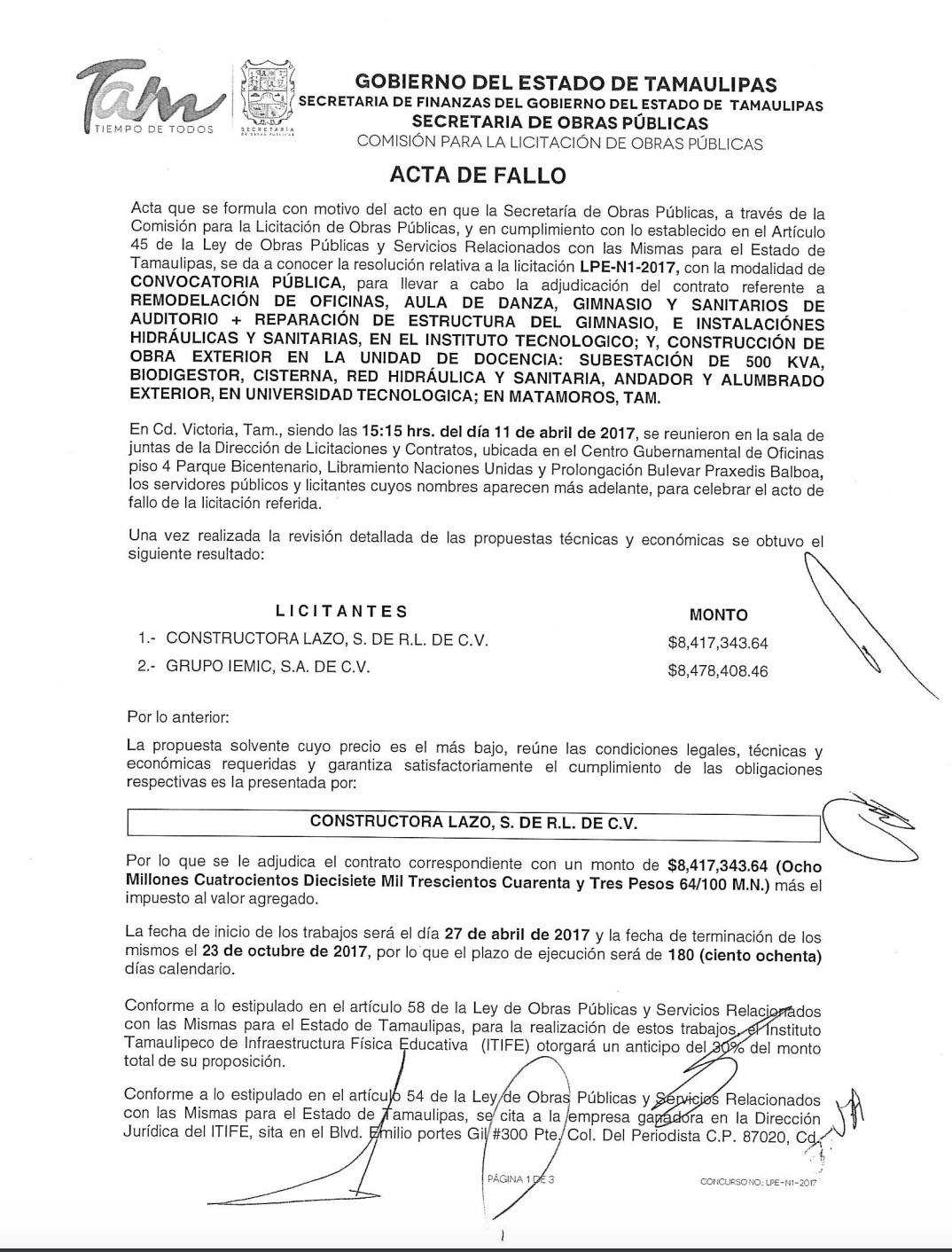
Francisco Javier Lazo Rodriguez owns Constructora Lazo S. de RL de CV, a successful construction company and beneficiary of multiple directly awarded government contracts from the Executive Office of Governor Francisco García Cabeza de Vaca, aka "El Sr. de los Cuernos" or "Lord of the Horns" (cuernos here is a double entendre since it's also a colloquialism for Kalashnikov rifles). Javier Lazo is the godfather of Carlos Martínez Perez, aka El Cuate, the son-in-law of Osiel Cárdenas. In addition to family ties, Cuate Martínez is also a business partner of Javier Lazo.
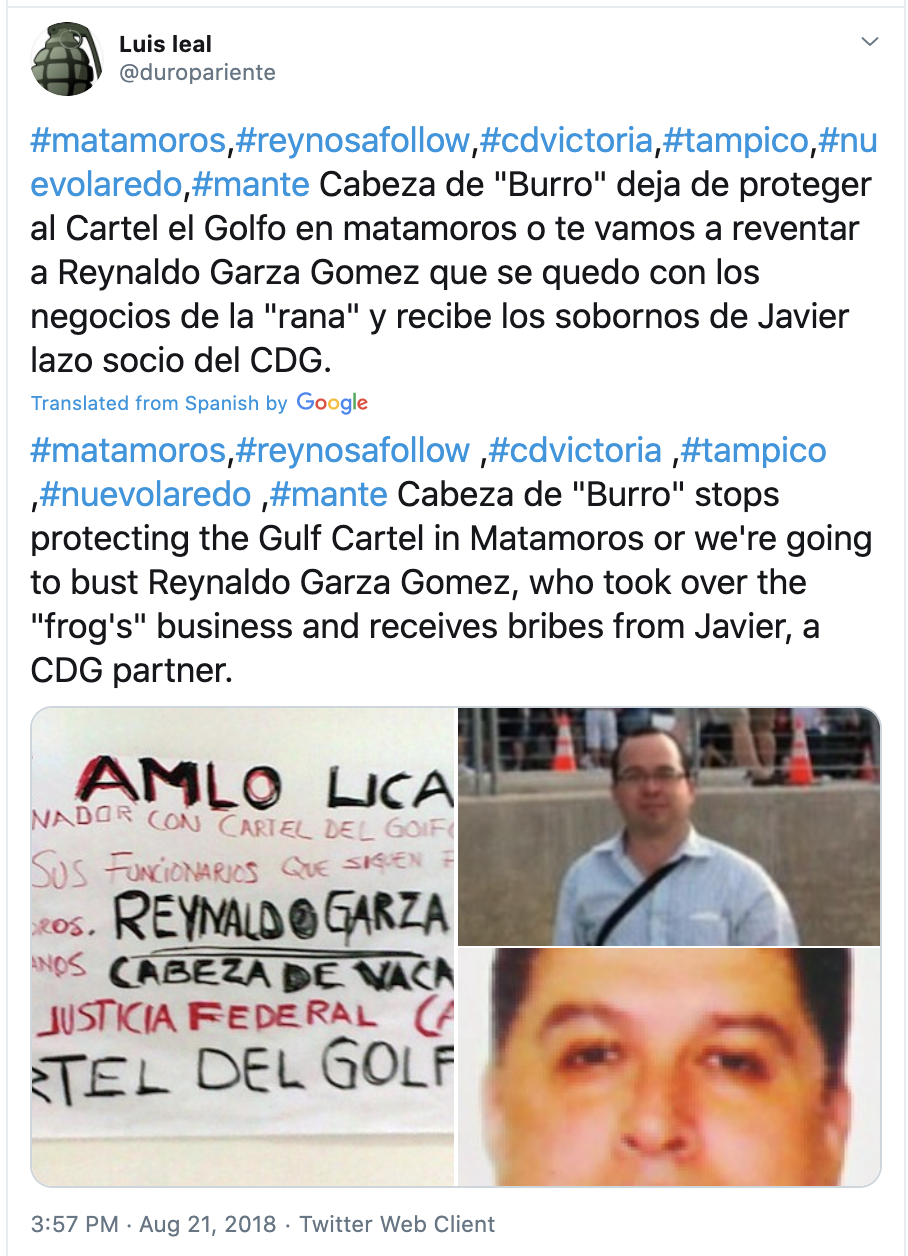

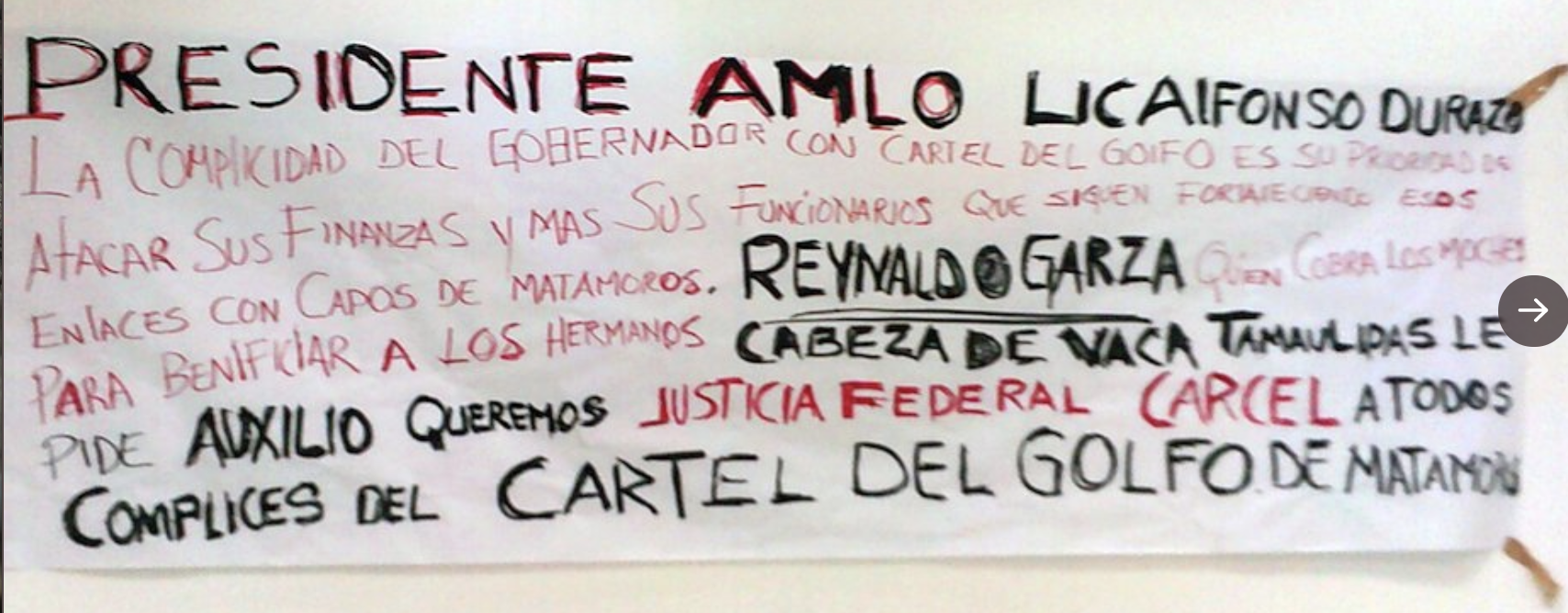
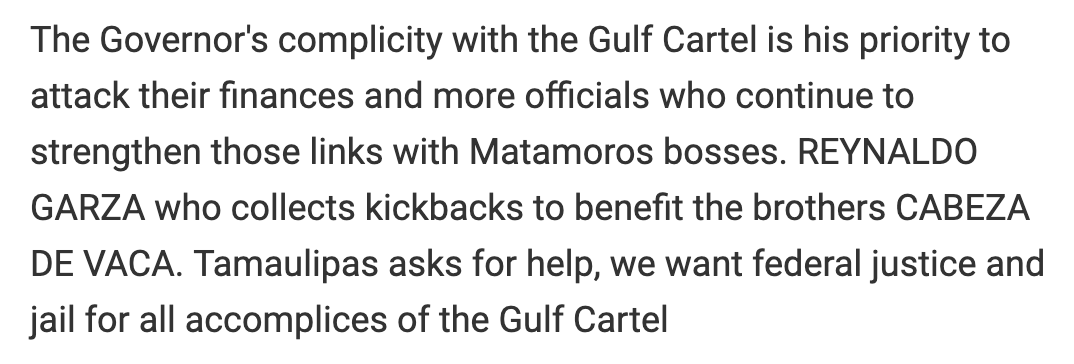
To be continued…
